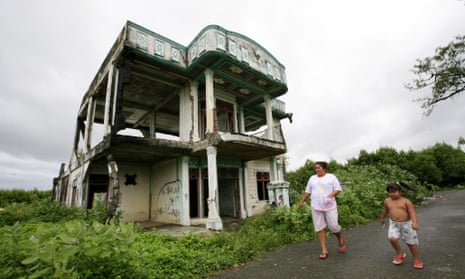Gains in disaster preparedness in Indonesia following 2004’s devastating tsunami could be wound back due to cuts to Australia’s foreign aid budget, aid organisations have warned.
The Coalition has slashed the aid budget by $11bn since taking office in September last year, a move that ActionAid said would have repercussions in the region.
“We are deeply concerned by the cuts,” its executive director, Archie Law, said. “The system is really straining.”
The head of Oxfam, Helen Szoke, said cutting the aid budget reduced Australia’s capacity to respond to crises as they emerged and redirected the focus away from disaster preparedness programs.
“If you cut the aid budget … something has got to give. We just don’t know where,” she said.
Just 6% of the OECD’s aid funding programs go to disaster risk reduction and other preventative measures, Szoke said. Cutting Australia’s contribution could have an impact on those programs.
“The indications are not promising,” she said. “What we have now are unprecedented cuts to aid levels,” she said.
The vast majority of the nearly $6.25bn in aid raised following the Indian Ocean tsunami went to immediate relief efforts such as providing food, shelter and sanitation. Only a small part went to education and infrastructure.
The Asia-Pacific region is prone to natural disasters, Szoke said, making prevention programs a vital part of the aid program.
Australia was a major aid donor to the post-tsunami relief effort in Indonesia’s Banda Aceh.
World Vision’s Tim Costello just returned to Australia following a trip to Aceh to assess the city’s recovery on the 10th anniversary of the disaster, which killed nearly 230,000 people worldwide. Costello said Aceh bore the brunt of that, with 160,000 casualties.
He said the city had been completely rebuilt in the wake for the disaster, adding that the billion dollars in aid given by the Howard government “completely reframed [Australia’s] relationship with Indonesia”.
World Vision received $118m in aid following the tsunami, which went towards building 3500 earthquake-proof houses in Aceh. “There just isn’t the dollars to do that again,” Costello said.
He is worried about the consequences of winding back Australia’s aid commitment to just 0.22% of gross national income. “The truth is, there’ll be savage aid cuts across all areas, including Indonesia,” he said.
Not knowing where the axe will fall was one of the hardest parts of planning an aid program, ActionAid’s Law said. “Everything is up for grabs,” he said. “Disaster risk reduction can always receive more support.”
He warned that cutting aid so savagely would reduce Australia’s influence on the global stage and cut off access to major international figures.
Costello thought the impact of aid cuts could be greatest in Australia’s own region. “It compounds the emerging story that we are selfish and don’t pull our weight,’ he said. “It tarnishes our image, reduces our trust.”

Comments (…)
Sign in or create your Guardian account to join the discussion